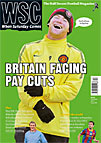 Mark Brophy questions club influence when so many players are caught bending the rules of the game
Mark Brophy questions club influence when so many players are caught bending the rules of the game
A lucky viewer watching Sky’s Goals on Sunday show a few weeks ago will have seen the star pairing, Ian Wright and Jermain Defoe, being quizzed on that weekend’s horror tackle furore. Have you, the question went, ever witnessed a manager telling his players to hurt the opposition deliberately? Jermain and Ian agreed that would never happen, though Wright then offered the caveat that no one needed to tell some of his ex-team-mates to do that – they were naturals at it.
The suspicion is that far more of this goes on than professionals care to admit, for obvious reasons, and that it isn’t a new development. Old pros growl about carrying out orders to see how fast a speedy opponent could limp, then attack present-day assailants of flair players – unless they played in the same strip as today’s thug. The current fashion for railing against dangerous play means that the spotlight is aimed squarely at those who show a lack of care for their fellow professionals and hypocrites who defend or criticise them. What sometimes gets missed is that a choice is exercised in every case.
Ethical decisions are made all of the time by those in the game. Seemingly from birth, footballers know that there are certain things they either should, or should not, do. Diving. Putting the ball out when an opponent is down. Trying to get opponents sent off. We all know which way round they’re supposed to go. The duty of care between players is commonly ignored. But those in the game also ignore the boundaries of acceptable conduct when making these other choices.
Whenever someone falls over to get the game stopped, pressure builds on the attacking team to do the sporting thing and put the ball out. In fact the sporting thing would be for everyone to carry on playing and score or prevent a goal by dint of their own skills. A referee can stop the game if he’s sufficiently worried about an injured player, but even a broken leg isn’t going to get any better or worse because play stops or continues at the other end for a minute or so. Unless Burke and Hare are about to snatch the body directly from the pitch, there is seldom reason for immediate attention.
The convention is a ridiculous chivalric charade, a distortion of the original intent in such gestures, spontaneous expressions of care towards a fellow player in trouble or an unwillingness to take advantage of the misfortune of others. Originally a genuinely sporting action to be applauded, now perverted by the very people it’s meant to benefit in order to stop better teams from making good on their advantage. Who’d blame Man Utd if they released a statement at the start of a new season saying “Don’t kick the ball out for us – we won’t do it for you”?
The only thing more annoying than someone lying down to break up play is when they then reassemble themselves and leap up like the enchanted skeletons in Jason and the Argonauts and start waving imaginary cards in the face of the referee. “No one likes to see that”, we’re told. But someone must, someone players listen to, or they wouldn’t be doing it. If it’s so beyond the pale, why do so many teams appear to be undertaking concerted campaigns to encourage referees to hand down the maximum tariff?
Of all these misdemeanours, however, the greatest ire is reserved for diving. It’s unquestionably cheating, but is it really any worse than any other form? Blocking an attacker’s run at a corner or pulling his shirt while the ball’s in the air are cheating too. Just as sneaky, with the same desired outcome – gaining an advantage by unfair means. We are led to believe that some forms of cheating are just defenders being clever, whereas others provoke national campaigns for lengthy bans. No matter how illogical this stance, every manager criticising diving has someone on their team doing the same.
The inescapable conclusion is that managers and fans want their players to misbehave like this, and the players are happy to comply. There’s an emptiness at the heart of the game in which it’s held that winning takes precedence over everything, even the most basic of moral codes. All pretence that football does anything else is just that – a sham, for the benefit of children and dullards. The only surprise is that anyone ever listened to the denials.
From WSC 286 December 2010